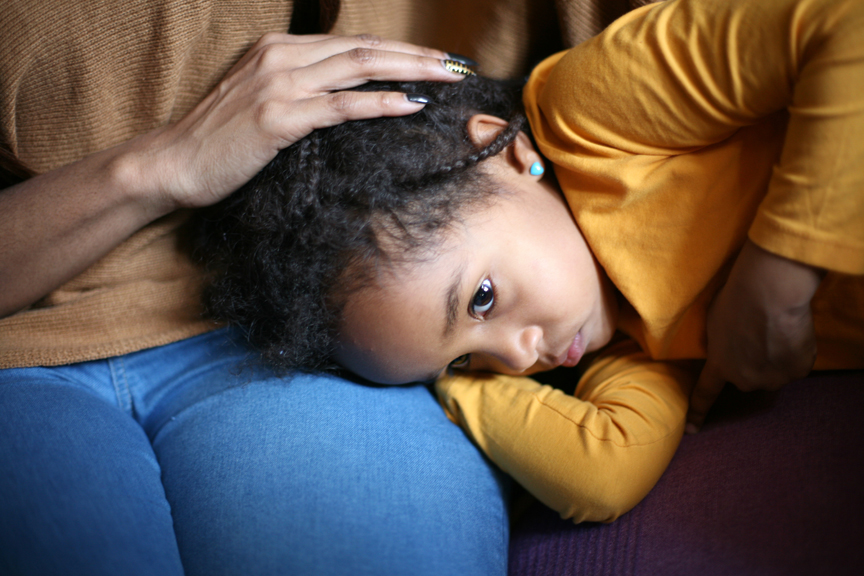- Behavior
- Health
- Parenting
Is my child grieving?

In this article, you’ll find answers to questions like:
1. What are the signs?
2. What's the best approach?
3. Who can help?
Young children often don’t know how best to articulate their feelings or are even aware of what they might be feeling.
This includes grief, says Shellie Solomon, president of Children of Inmates based in nearby Broward County.
And to further complicate the matter, children’s grief can look quite different from the way adults mourn. Obviously, grieving can stem from the death of a parent, grandparent or sibling, but other causes could be the loss of family structure from divorce or the incarceration of a parent. Or, perhaps a friend moved away or a beloved pet passed away.
1. WHAT ARE THE SIGNS?
Actually, children may sometimes grieve better than adults.
“Children feel whatever they are feeling in that moment and go right back to playing and laughing after,” says Christina Dekkar, former counseling resource leader of Trustbridge in West Palm Beach, the parent of Hospice of Palm Beach County.
With grief, it’s normal to see a change in sleep, appetite, mood, behavior, school performance and concentration, says Kerry DeBay, chief program officer in Palm Beach County for The Children's Healing Institute in West Palm Beach. There is no set time for how long is too long. However, the absence of these signs doesn’t mean they aren’t grieving.
“Just because you can’t see it on the outside doesn’t mean it’s not happening on the inside,” DeBay says.
Signs your grieving child may need bereavement counseling include nightmares, prolonged denial and inability to return to routine, Dekkar says.
“And that is just touching the surface,” she says.
2. WHAT'S THE BEST APPROACH?
It’s important for children to understand what they’re experiencing is normal. DeBay suggests parents and caregivers try to:
- LISTEN: Allow children to share their thoughts and stories without judgment.
- ALLOW THEM THEIR FEELINGS: Don’t try to talk them out of feeling sad, angry or guilty. Children need to know all feelings are OK.
- FIND WAYS TO EXPRESS THEIR FEELINGS: Help them recognize, learn and practice safe ways to let out their feelings.
- BE A ROLE MODEL: Children will learn grief is OK if adults share and express their own feelings in a healthy manner.
3. WHO CAN HELP?
- Children of Inmates, based in Hallandale Beach, identifies and links children in need of support to appropriate organizations and services. It strengthen bonds between children, caregivers and incarcerated parent(s) when appropriate through support groups and letter-writing nights. Call 888-757-5439.
- Trustbridge Bereavement Centers’ Sea Star Children's Program offers services to families and friends of Hospice of Palm Beach County patients, as well as to the community at large. Options include school support groups, family fun events and helping grieving families connect to see it’s OK to laugh and have fun again. Examples include the weekday Camp Stingray for children ages 5 to 10 and the annual bereavement Camp Good Grief for children. Call 561-227-5175.
SOURCES:
• Kerry DeBay, chief program officer, Palm Beach County, The Children's Healing Institute
• Shellie Solomon, president, Children of Inmates
• Christina Dekkar, former counseling resource leader, Trustbridge
You May Also Like
-
- Behavior
- Health
- Parenting
Five signs your child is grieving
The grieving process has five stages: blame, denial, guilt, anger and acceptance. Read on for details. …
Read More -
- Behavior
- Health
- Parenting
What are clues that my child needs emotional counseling?
While temper tantrums and bad moods are a normal part of childhood, they might indicate an underlying mental health concern if they are severe or persist. Read on to learn about th …
Read More
Related resources
-
- Behavior
- Health
Children's Bereavement Center
This counseling agency provides free Peer Support Groups for children, young adults, and adult caregivers after the death of a loved one. Groups are open to anyone who has lost a parent, sibling, grandparent, relative, or friend as a result of illness, accident, suicide, or homicide. Losses can be recent or in years past.
888-988-5438 Website -
- Behavior
- Safety
The Children's Healing Institute
Child-abuse prevention and family crisis management services based in West Palm Beach. Specific services include: Parent Aide Program - weekly, in-home support for families to enhance parenting and problem-solving skills and provide support and services. TEACUP Preemie Program - help parents with premature newborns navigate the medical system, reduce stress and provide support. FirstPlay - infant play therapy that helps parents bond with their babies.
561-687-8115 Website -
- Behavior
- Health
Trustbridge (Hospice of Palm Beach County)
Services and support for families facing serious illness or needing end-of-life care, including caregiver support and bereavement programs
844-422-3648 Website -
- Other
- Parenting
- Safety
Children of Inmates
An organization that reintroduces children to their incarcerated parents to create positive memories and bonding experiences
1-888-757-KIDZ (5439) Website Email -
- Behavior
- Health
- Parenting
Children's Behavioral Health Collaborative - Palm Beach County
A collaboration of five local mental health agencies that assess and treat children's serious behavioral, emotional or mental health problems
561-244-9499 Website
